(Translation) 李珥 答成浩原(壬申)
| Primary Source | ||
|---|---|---|
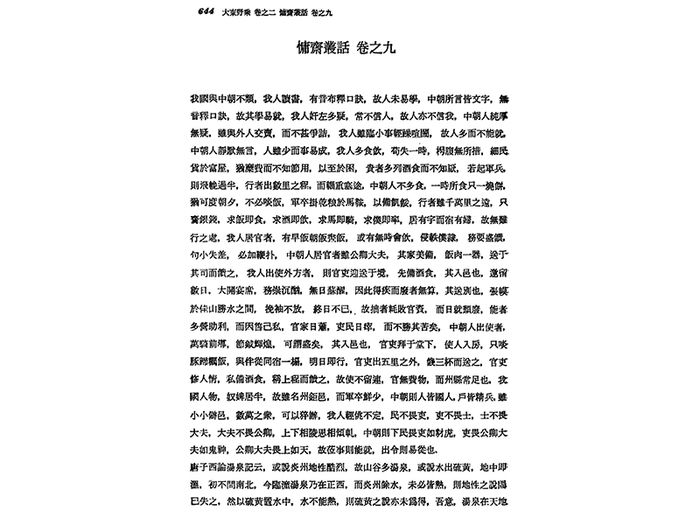 |
Title | |
| English | ||
| Chinese | 文明論 | |
| Korean(RR) | 문명론(Munmyeongnon) | |
| Text Details | ||
| Genre | Literati Writings | |
| Type | ||
| Author(s) | 成俔 | |
| Year | ||
| Source | Korean Classics and Literati's Collection of Writings (한국고전종합DB) | |
| Key Concepts | ||
| Translation Info | ||
| Translator(s) | Participants of 2019 JSG Summer Hanmun Workshop (Advanced Translation Group) | |
| Editor(s) | ||
| Year | 2019 | |
목차
- 1 Introduction
- 2 Original Script
- 3 Discussion Questions
- 4 Further Readings
- 5 References
- 6 Translation
- 6.1 (sample) : Jaeyoon Song
- 6.2 Student 1 : (Write your name)
- 6.3 Student 2 : (Write your name)
- 6.4 Student 3 : (Write your name)
- 6.5 Student 4 : (Write your name)
- 6.6 Student 5 : (Write your name)
- 6.7 Student 6 : (Write your name)
- 6.8 Student 7 : (Write your name)
- 6.9 Student 8 : (Write your name)
- 6.10 Student 9 : (Write your name)
- 6.11 Student 10 : (Write your name)
- 6.12 Student 11 : (Write your name)
- 6.13 Student 12 : (Write your name)
- 6.14 Student 13 : (Write your name)
- 6.15 Student 14 : (Write your name)
Introduction
Original Script
| Image | Text | Translation |
|---|---|---|
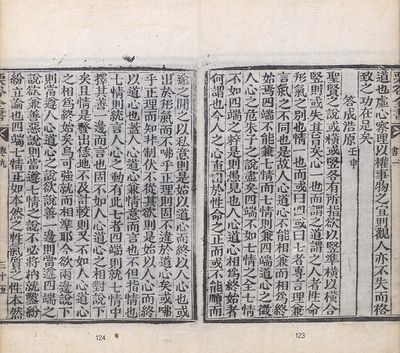
|
◎ 老頭陀面壁念佛, 忽思世間夫婦, 對飯同被, 歡樂無比. 錫杖下山, 忽見井上有黃頭黑面, 如九子魔母者, 散髮痛哭. 詢之, 與夫鬨也. 頭陀色然駭, 回上山來. | 老頭陀面壁念佛
An old monk facing a wall chants the name of Buddha. On spur of moment a thought emerged husband and wife in the world of desire. Having meal facing one another sharing one bed – an incomparable joy. The monk took his cane and went the way down the mountain. Suddenly he saw by the well with yellow hair and black face a real Nine sons mother demon [1] roaring loudly all around / with disheveled hair crying bitterly. calling his husband back. As he asked her [what was going on], says she fought with her husband. Frightened, pale with fear The monk got back the way up.
|
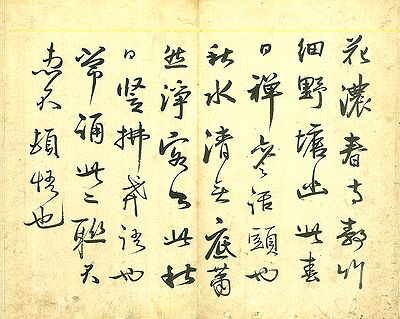
|
◎ “花濃春寺靜, 竹細野塘幽.” 此春日禪參話頭也. “秋水淸無底, 蕭然淨客心.” 此秋日竪拂戒語也. 常誦此二聯, 不患不頓悟也. |
Among the flowers in full bloom, the spring temple is serene; among the delicate bamboo, the pool/pond in the wilderness is secluded.[1] This is the Ultimate Theme (hwadu) to practice Zen during the spring days.[2] The autumn waters are clear and bottomless, its desolation purifies the traveler’s mind.[3] This is the admonition to erect Buddha’s mind[4] during the autumn days. If you recite these two lines evermore, there will be no worries about not gaining a sudden enlightenment.
[4] No idea about this one: “to raise the fly whisk” In Chan literature, a masterʼs way of signaling that he was about to begin a lecture. http://www.buddhism-dict.net/cgi-bin/xpr-ddb.pl?8c.xml+id(%27b8c4e-62c2%27) 拂子 Made out of hemp, silk or animal hair, used by Buddhist monks so that flies and other insects may be chased away without killing them. The tradition of using the whisk comes to Buddhism from Jainism, but in East Asian Chan, Seon and Zen schools, the usage of the whisk by the master teacher during his sermons becomes ritualized. One of the seven possessions of a monk 七事隨身 (Skt. vyajana, vāla-vījanī; Pāli vijanī). http://www.buddhism-dict.net/cgi-bin/xpr-ddb.pl?62.xml+id(%27b62c2-5b50%27) |
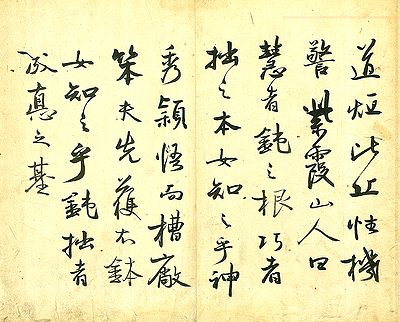
|
◎ 道烜比丘性機警. 紫霞山人曰: “慧者鈍之根, 巧者拙之本. 女知之乎? 神秀穎悟, 而槽廠笨夫, 先獲衣鉢, 女知之乎? 鈍拙者, 成德之基.” |
Venerable Dohwon is sharp-witted. Jahasanin said: “Dullness is the root of wisdom; Clumsiness is the origin of ingenuity.” Do you know what it is? Shenxiu was (considered) perspicacious.[1] However, it was Huineng who first inherited the legacy (lit. mantled alms bowl) from the master.[2] Have you heard of it? (Therefore,) dullness and clumsiness is the foundation of achieving virtue.[3] [1]This perspicacious-ness is deeply engaged with the Chan notion of "sudden enlightenment (頓悟)." Zen Master Shen Xiu (?~706) was a Tang Buddhist monk, who is considered as the progenitor of the Northern Chan Order (北宗禪). [2] Zen Master Huineng (638~713) was a Tang Buddhist monk, who is the sixth patriarch of Chan Buddhism, and also founding father of the Northern Chan Order (南宗禪). [3] The debate between "sudden enlightenment" and "gradual cultivation" is a long-lasting dispute in the Chan Buddhist tradition. According to the Platform Sutra (六祖壇經), for example, Shenxiu was considered to be the best and most erudite monk among Venerable Hong Ren's pupils. Hence, his fellow monks took it for granted that he would be the six patriarch of the Chinese Chan Order. However, it was Huineng who ended up being selected to take up the position. From this point on, the Chinese tradition of Chan Buddhism started to divide into the Southern/Northern Orders, which are representative of sudden enlightenment and gradual cultivation respectively.
|
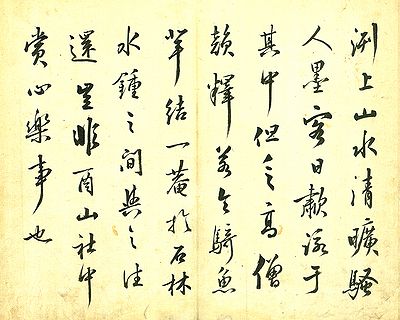
|
◎ 洌上山水淸曠, 騷人墨客, 日歗詠于其中. 但乏高僧韻釋. 若令騎魚輩, 結一菴於石林水鍾之間, 與之往還, 豈非酉山社中賞心樂事也. |
Along Yŏlsu[1], the rivers are clear and the mountains are extensive. From day to day, poets and writers recite and chant [their poems] in between [the rivers and mountains]. But they lack lofty priests and rhyming monks. If asking Ki-Ŏ and his friends to build a hermitage between the Stone Forest and the Water Bell[2], and to socialize with the poets and writers, isn't this a delightful matter that pleases the hearts of those in the literary society of Yusan? [1] Yŏlsu 洌水 is the old name of the Han River. It is also the pen name of Chŏng Yag-yong. [2] The Water Bell refers to Sujongsa 水鍾寺 (Water Bell Temple).
|
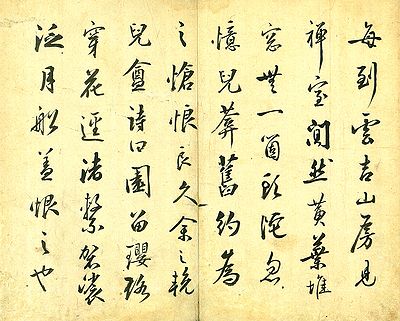
|
◎ 每到雲吉山房, 見禪室閴然, 黃葉堆窓, 無一箇頭陀. 忽憶兒葊舊約, 爲之愴悢良久. 余之輓兒盦詩曰: “園留瓔珞穿花逕, 渚繫袈裟泛月船.” 盖恨之也. |
When I reach the Hermitage of Cloud Delight Mountain Each time I see the meditation room so hollow. The stacks of yellow leaves on the window sill Not a single monk ever shown. Suddenly I remember the old promise With Aam. Thus I stay for a long lamenting. In memory of Aam I wrote this verse: "Piercing the flowery paths your bead necklace is still there, and your monk robe is still hanging on a moonlit boat." I was overwhelmed by sorrow.
|
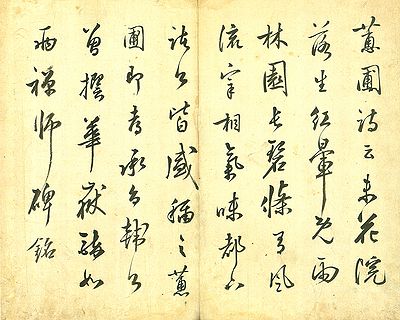
|
◎ 蕙圃詩云: “未花院落生紅暈, 旣雨林園長碧條.” 有風流宰相氣味, 都下諸公, 皆盛稱之. 蕙圃卽都承旨韓公, 曾撰華嶽醉如兩禪師碑銘. |
Hyepo's poem says: Before blooming, the reddish hues radiate in the courtyard. After raining, the green twigs grow in the sylvan hills. Having the quality of an artistic prime minister, he was passionately praised by all the dukes in the capital area. Hyepo is Duke Han, First Royal Secretary, who has written the epitaphs for two master monks, Hwaok and Chiyeo. |
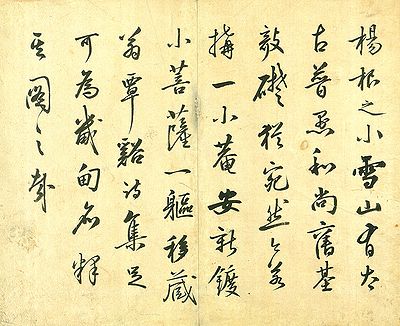
|
◎ 楊根之小雪山, 有太古普愚和尙舊基. 欹礎猶宛然. 今若搆一小菴, 安新鍍小菩薩一軀, 移藏翁覃溪詩集, 足可爲畿甸名釋. 其圖之哉. | |
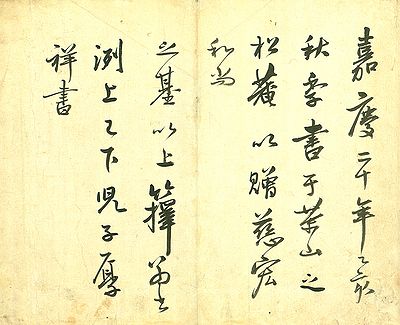
|
◎ 嘉慶二十年乙亥秋季, 書于茶山之松菴, 以贈慈宏和尙. |
Discussion Questions
Further Readings
References
Translation
(sample) : Jaeyoon Song
- Discussion Questions:
Student 1 : (Write your name)
- Discussion Questions:
Student 2 : (Write your name)
- Discussion Questions:
Student 3 : (Write your name)
- Discussion Questions:
Student 4 : (Write your name)
- Discussion Questions:
Student 5 : (Write your name)
- Discussion Questions:
Student 6 : (Write your name)
- Discussion Questions:
Student 7 : (Write your name)
- Discussion Questions:
Student 8 : (Write your name)
- Discussion Questions:
Student 9 : (Write your name)
- Discussion Questions:
Student 10 : (Write your name)
- Discussion Questions:
Student 11 : (Write your name)
- Discussion Questions:
Student 12 : (Write your name)
- Discussion Questions:
Student 13 : (Write your name)
- Discussion Questions:
Student 14 : (Write your name)
- Discussion Questions: